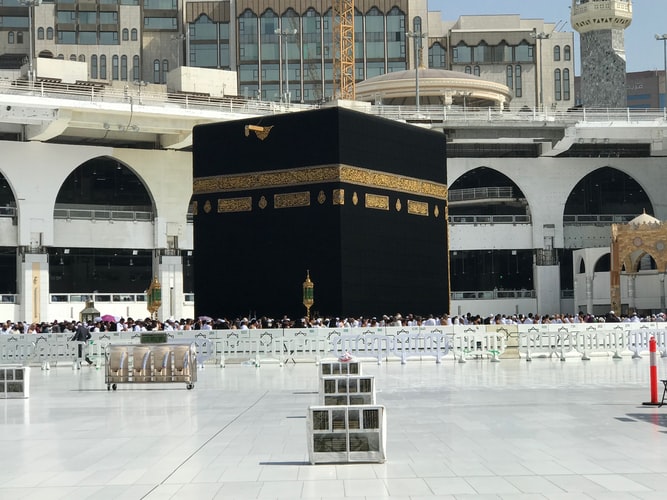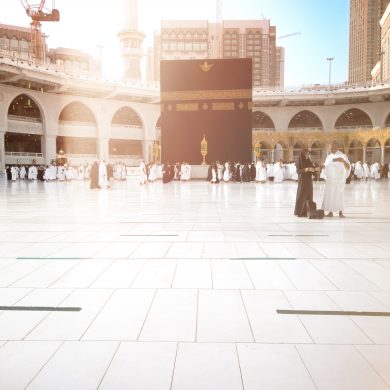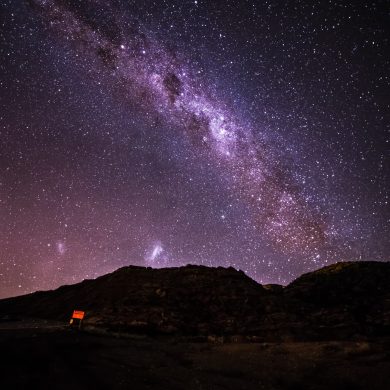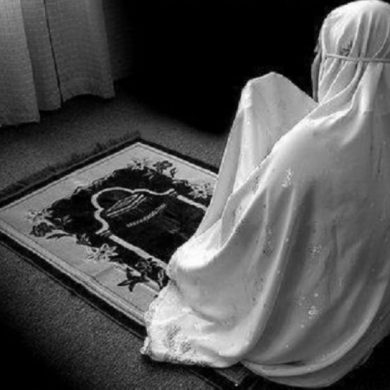Dhul Hijjah is the final month of the twelve months in Islamic calendar. The meaning of dhul Hijjah is the month of pilgrimage. The rites of pilgrimage to be performed with ease during this month made it as a sacred month. The best 10 days of the year are often referred to the first 10 days of dhul Hijjah that include the Hajj and Eid al Adha. Hajj, which is the pilgrimage to Mecca and one of the ten ancillaries of the faith takes place in dhul Hijjah in the first 10 days of the month. Every Muslim must perform Hajj once in their lifetime if they are eligible physically and a financially, as indicated in Surah ‘Al Imran[i] verse 97 Pilgrimage to the House is a duty owed to Allah by all who can make their way to it.
The Prophet ‘peace be upon him’ mentioned: “There are no days on which righteous deeds are more beloved to Allah than these ten days, fasting every day of them is the equivalent of fasting a year, and standing every night of them (in prayer) is the equivalent of standing on the Night of Qadr”[ii].He also added as it was narrated from abu Qatadah, “Fasting on the day of ‘Arafah is an expiation (of sins) for two years, the year preceding it and the year following it”[iii].
There are several more factors that contribute to the significance of the 10 days of dhul Hijjah. An oath that Allah swears by 10 days in the Quran in Surah al Fajr; verse 1-2 “by the dawn and by the ten nights ”[iv] indicates their importance. Also ibn Katheer in his tarsier referred this to dhul Hijjah. It was also narrated that Prophet said, implementing any good deed during these ten days preferable than the other days, even better than the Jihad for seeking Allah, except if a man goes out for Jihad and carries all his wealth and not returning with them[v].
One of the four sacred months (dhul Qa’dah, dhul Hijjah, Muharram and Rajab) of the Islamic calendar is this month according to Surah al Tawbah[vi], verse 36 Surely, the number of months according to Allah is twelve (as written) in the Book of Allah on the day He created the heavens and the Earth, of which there are Four Sacred Months. These months[vii] were chosen above the other months by Allah, and they are distinguished as ‘al ashhur al hurum’ as starting war during them is haram or forbidden. In addition to these features, any good deed’s award is doubled during these ten days and the misdeed’s punishments is multiplied.
The ninth day of dhul Hijjah is called Arafah. According to a hadith,” Hajj is Arafah”. It was narrated that the prophet said the witness day in Surah al Buruj verse 3[viii](By the witness and that which is witnessed)[ix] is Friday and the witnessed day is the day of Arafah and it is similar to Friday prayer that can presented once a week in masjid, this day can be seen once a year in Arafat during Hajj. The prophet also statesThere is no day on which Allah frees people from the Fire more so than on the day of ‘Arafah. He comes close to those (people standing on ‘Arafah), and then He reveals before His Angels saying, ‘What are these people seeking”. [x]
Lastly, Eid al Adha (the feast of sacrifice) is the tenth day of dhul Hijjah, which is also known as the day of nahr (slaughtering an animal for the sake of Allah) as claimed by the Prophet. It is the greatest Eid for the believers of Allah; it takes place at the end of Hajj when the Muslims are purified from their sins. According to Prophet Mohammed, the remarkable day of Hajj is this day.
The Prophet explained that the origin of this Eid is presented to us from Prophet Ibrahim, who submitted to Allah when he saw himself in his dream sacrificing his only son Ismail. He did not hesitate to obey Allah even if the command was so difficult. While Prophet Ibrahim was fulfilling his command and took a knife to sacrifice his child for the sake of Allah, Ismail was replaced with a ram by the interfering of Allah, who was testing the Iman level of his Prophet. The great mercy of Allah upon Prophet Ibrahim is celebrated in this day, as well as the significance of trusting Allah, and his infinite compassionate is remembered too.
Having perfect certainty in Allah is mentioned in the Qur’an, Surah al Talaq verse 2-3[xi] ,Allah will create a path to remove anyone from any hardness if they fear Allah and keeping their obligation to Him and they will be supplied with sources that could not be assumed. (“And whoever fears Allah – He will make for him a way out. And will provide for him from where he does not expect. And whoever relies upon Allah – then He is sufficient for him. Indeed, Allah will accomplish His purpose”). Any pilgrim on Hajj must offer a goat, a sheep, a cow, a camel or other such animal as a sacrifice to Allah, remembering this crucial incident of Prophet Ibrahim. In this regard, Allah (swt) said in Qur’an surah al Hajj verse 37[xii]; “Allah will not obtain their meat or blood but the piety from believers reaches Him”. Donating these meats to the people who are in need is the wisdom of this sacrifice as Prophet Mohammed said “all people of the community are responsible towards each other”[xiii]. Furthermore, it was pointed out from the Qur’an in surah al Kawthar verse 2[xiv]: “Therefore turn in prayer to your Lord and sacrifice (to Him only)”.
Having demonstrated the unique features of the first ten days of dhul Hijja, we realise the great significance of these sacred days. A combination of the greatest acts of worship are represented during these days. Prayers, fasting, charity and Pilgrimage are good examples of this.
By Sister Sara Mohammed Jafar
[i] وَلِلّٰهِ عَلَى النَّاسِ حِجُّ الۡبَيۡتِ مَنِ اسۡتَطَاعَ اِلَيۡهِ سَبِيۡلًا
[ii] https://www.humanappeal.org.uk/news/news-2020/the-importance-of-the-first-10-days-of-dhul-hijjah/
[iii] http://www.ummah.co/importance-of-the-first-10-days-of-dhul-hijjah/
[iv] والفجر وليال عشر
[v] https://www.ohio.edu/orgs/muslimst/downloads/Dhul_Hijjah.pdf
[vi] إِنَّ عِدَّةَ الشُّهُورِ عِندَ اللّهِ اثْنَا عَشَرَ شَهْرًا فِي كِتَابِ اللّهِ يَوْمَ خَلَقَ السَّمَاوَات وَالأَرْضَ مِنْهَا أَرْبَعَةٌ حُرُمٌ
[vii] الاشهر الحرم
[viii] وَشَاهِدٍ وَمَشْهُودٍ https://www.muslimaid.org/what-we-do/religious-dues/qurbani/the-day-of-arafah/
[ix] https://tafseerstudy.wordpress.com/juzz-amma/85-al-burooj/85-al-burooj/
[x] https://www.muslimaid.org/what-we-do/religious-dues/qurbani/the-day-of-arafah/
[xi][xi] وَمَنْ يَّتَّقِ اللّٰهَ يَجْعَلْ لَّهٗ مَخْرَجًا ۙ
وَّيَرْزُقْهُ مِنْ حَيْثُ لَا يَحْتَسِبُۗ وَمَنْ يَّتَوَكَّلْ عَلَى اللّٰهِ فَهُوَ حَسْبُهٗ ۗاِنَّ اللّٰهَ بَالِغُ اَمْرِهٖۗ قَدْ جَعَلَ اللّٰهُ لِكُلِّ شَيْءٍ قَدْرًا
[xii] لَن يَنَالَ اللَّهَ لُحُومُهَا وَلَا دِمَاؤُهَا وَلَكِن يَنَالُهُ التَّقْوَى مِنكُمْ
[xiii] https://www.almaaref.org/maarefdetails.php?id=12786&subcatid=1740&cid=308&supcat=37
[xiv] فَصَلِّ لِرَبِّكَ وَٱنْحَرْ






